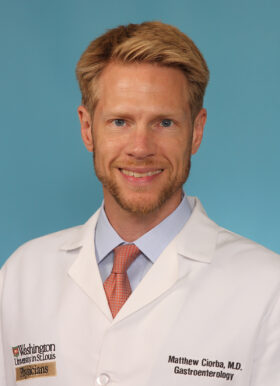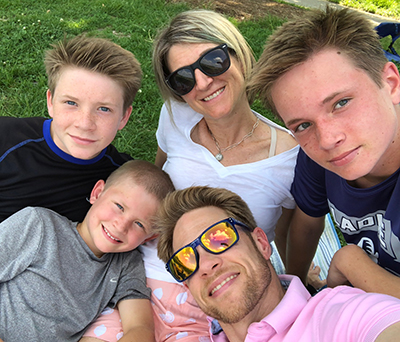Matthew Ciorba, MD

Matthew Ciorba, MD, is a gastroenterologist who specializes in inflammatory bowel disease, ulcerative colitis and Crohn’s disease.
Dr. Ciorba sees patients at:
- The Center for Advanced Medicine, 4921 Parkview Place, Suite 8C, St. Louis, MO 63110
Please call 314-747-2066 for an appointment.
What happened in the course of schooling to influence you to choose your specialty?
I didn’t start out planning to be a physician — in fact, I was a political science and French major in college. It was during my second year of college when I took some science classes and realized how much I enjoyed them. Those classes started me on the path towards medical school. I was inspired by the potential opportunities that came with being a physician. That’s what got me into medicine in the first place.
I chose to specialize in internal medicine and in particular, gastroenterology, because I loved the ability to connect with and care for patients over their lifetime. I was inspired to go into gastroenterology largely because the diseases that I now treat, predominately Crohn’s disease and ulcerative colitis, have been my passion since medical school and throughout my training.
Crohn’s disease and ulcerative colitis are both very common conditions, but seeing how they can affect many aspects of a patient’s life has always been profound for me. I remember in medical school, there were very few approved therapies – beyond steroids and anti-diarrheal therapies. I saw this as a patient population in significant need of new therapies and that experience inspired me to want to make a major impact in research and treatment of these diseases.
What brought you to Washington University?
The internal medicine program and the city of St. Louis both brought me to Washington University. During our interview trail, my wife and I toured medical centers on the East coast and various areas – doing a combination of camping and staying in hotels. When we came to St. Louis, I just loved the city. The internal medicine program at Washington University was remarkable and had a great energy. I could tell that the residents were clearly cared about, and the hospital and faculty physicians were inspiring. I saw this as a place to continue to grow in my career, because I would get excellent training in clinical medicine as well as my specialty – all at the same institution.
We loved the city of St. Louis. Being from the Midwest, there was a comfortable feel to the city, and yet at the same time, it was a much bigger city than where I grew up in Iowa.
We’ve done a lot of float trips and camping in Missouri. We have certainly enjoyed much of nature’s bounty here.
Which aspect of your practice is most interesting?
The most interesting aspect about my practice is the variety of the things I do. I get to spend a lot of time teaching, not only medical students and residents, but also health care professionals and gastroenterologists around the country. This is enjoyable, and I learn a lot from them along the way as well.
I also have a continuity of care with the patients I see who have Crohn’s disease and ulcerative colitis — both lifelong illnesses. I see my patients throughout the phases of their lives – from initial diagnosis, through high school, college graduations, first jobs, getting married and having children and grand children. It is very rewarding to help my patients do well and live a normal life.
The last piece of my practice is research – which is a major passion of mine. The opportunities to move forward in the field and look for the next therapies in Crohn’s disease, ulcerative colitis and colon cancer are tremendously satisfying components of my job.

What new developments in your field are you most excited about?
New therapies, as well as advancements in the understanding of the underlying genetics for inflammatory bowel diseases (Crohn’s disease and ulcerative colitis), have increased significantly over the last 10-15 years. When I first started in this field, most patients experienced adverse side-effects from the treatments. That has now changed, and with new therapies available today, more than 60% of patients effectively treated can almost forget they have the disease.
I suspect that within the next 5-10 years, we will have effective therapies for more than 90% of people with inflammatory bowel disease (IBD). They should be able to have the quality of life they want, without any impact from their disease.
Most of the therapies are medicines that have been intelligently designed to specifically target the abnormal inflammatory pathways that drive the disease. We are also finding ways for these medicines to not cause the systemic side-effects outside the gut. This is a tremendous advance in the field of gastroenterology and IBD.
What is the difference between Crohn’s and ulcerative colitis?
Crohn’s disease can affect the entire gastrointestinal tract – including the mouth, stomach, small intestine and colon. Ulcerative colitis typically only affects the colon.
However, symptoms of both diseases are similar and can include diarrhea, abdominal pain and bleeding.
Is there any research you are involved in right now?
One area of research is called sponsored clinical research. These are trials of medicines that have been developed by pharmaceutical companies. We are able to offer these new medications for our patients who are not responding to current therapies.
Another area of research involves investigating the underlying mechanisms in the connection between inflammation and colon cancer. We are using this to exploit how colon cancer grows and to develop new therapies.
Finally, we are also doing research to understand how probiotic bacteria (good bacteria) can benefit the gut. By intersecting good bacteria with cancer therapy, our goal is to limit the adverse side-effects associated with cancer-related therapy.
Where are you from?
I was born in Wisconsin and grew up in Iowa. I went to The University of Iowa for both undergraduate and medical school. After medical school I moved to St. Louis – so I’m a Midwesterner as well as a Hawkeyes and Cardinals fan through and through.
Which particular award or achievement is most gratifying?
One of the most satisfying achievements I’ve had in my professional career was receiving tenure from Washington University. When I entered into my faculty position here, achieving tenure was an important goal – even though it was not on my mind when I was growing up. Living on a farm and then in a small town in Iowa, I had no vision of what a large medical center and research university would be like. Going through the rigorous process required to get tenure was a great accomplishment.
My personal achievement would be staying active in my three sons’ lives – as a coach for their sports and a leader in their scouting programs. I’ve been able to actively experience their stages of growing up, and that in itself has been a great achievement.
What is the best advice you’ve received?
I am always seeking advice and have received a lot of excellent advice over the years. But one piece of advice has been especially meaningful — it was the topic of an essay I wrote in order to get a scholarship in medical school. The topic was: “Work makes life sweet.” This resonated with me, not because you need to spend all your time working in order to make life sweet, but that you have to have an enjoyment and passion for what you are doing when you work. Medicine and academic medicine make my life sweet.
If you weren’t a doctor, what would you like to be doing?
I may have been an environmental engineer because I love the environment and the ability to make the environment better.
I like the mathematical side of things, understanding the details and designing ways to improve systems and implementing those systems for greater change.